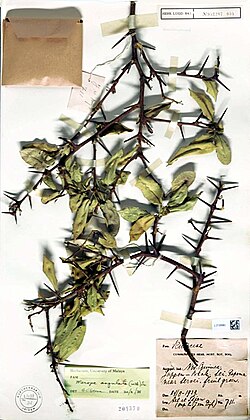Biology:Merope angulata
| Merope angulata | |
|---|---|

| |
| Scientific classification | |
| Kingdom: | Plantae |
| Clade: | Tracheophytes |
| Clade: | Angiosperms |
| Clade: | Eudicots |
| Clade: | Rosids |
| Order: | Sapindales |
| Family: | Rutaceae |
| Subfamily: | Aurantioideae |
| Tribe: | Citreae |
| Genus: | Merope M.Roem. (1846) |
| Species: | M. angulata
|
| Binomial name | |
| Merope angulata (Willd.) Swingle (1915)
| |
| Synonyms[2] | |
| |
Merope angulata is a species of flowering plant in the family Rutaceae. It is a tree that ranges from northeastern India through Bangladesh, Myanmar, the Andaman and Nicobar islands, Peninsular Malaysia, Borneo, Java, Sulawesi, the Philippines , and Maluku Islands to New Guinea.[2] It is the sole species in genus Merope.
It is an erect shrub growing up to 3 meters tall, with sparse stems growing from a root crown. Stout spines 1.5 – 3.5 cm long grow on the axils of juvenile stems. Leaves are oval, alternate, thick, and leathery, measuring 4.5 – 16 by 2 – 7 cm. The leaves are oval with blunt or slightly pointed tips and slightly notched leaf edges. They are aromatic with a lime-like scent when bruised. Flowers are white, fragrant, solitary, and bisexual, about 2 cm long, and grow in leaf axils in pairs or small clusters.[3]
The plant is salt-tolerant[4] and grows in coastal mangrove swamps, tidal forests, and brackish wetlands.[3]
The species is threatened with habitat loss from destruction of its native habitat for agriculture, aquaculture, coastal development, and tourism. Its natural regeneration is limited by sparse seed production and poor seedling establishment.[4] The IUCN Red List assesses the species' conservation status as least-concern across its range.[1] It is assessed as critically endangered in Singapore, endangered in Peninsular Malaysia, and rare and threatened in India. Indian populations of the species are limited to the Jharkhali islands of the Sunderbans in West Bengal, and to the Bhitarkanika Mangroves and Mahanadi River Delta in Orissa.[4]
References
- ↑ 1.0 1.1 IUCN SSC Global Tree Specialist Group.; Botanic Gardens Conservation International (BGCI). (2022). "Merope angulata". IUCN Red List of Threatened Species 2022: e.T215236095A215236097. doi:10.2305/IUCN.UK.2022-2.RLTS.T215236095A215236097.en. https://www.iucnredlist.org/species/215236095/215236097. Retrieved 15 December 2023.
- ↑ 2.0 2.1 Template:Cite powo
- ↑ 3.0 3.1 "Merope angulata". https://www.nparks.gov.sg/florafaunaweb/flora/6/2/6232. Retrieved 14 December 2023.
- ↑ 4.0 4.1 4.2 Jena, Satya Narayan; Verma, Sushma; Nair, Kuttan Narayanan; Srivastava, Awadhesh Kumar; Misra, Sujata; Rana, Tikam Singh (2015). "Genetic diversity and population structure of the mangrove lime (Merope angulata) in India revealed by AFLP and ISSR markers". Aquatic Botany 120: 260–267. doi:10.1016/j.aquabot.2014.09.004.
Wikidata ☰ {{{from}}} entry
 |


